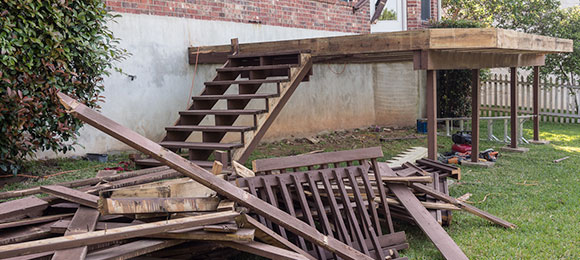
Updated January 20, 2023
If you read our article on how to stop procrastinating, you know that homeowners are bombarded with decision after decision in addition to the choices they have to make in their day-to-day life.
This onslaught of decision making can leave you feeling overwhelmed, stressed, and anxious, which can lead you to procrastinate and eventually lead to depression. This is commonly known as decision fatigue, or a state of mental overload that can limit your ability to make decisions.
Most people have experienced decision fatigue at one point or another, and this is especially common during the various decision making that comes with homeownership and upgrading or remodeling your home.
The good news is: Decision fatigue is avoidable, and we've got some big tips to help you avoid it when it comes to home projects.
Jump to:
- Minimize Stress
- Follow a Routine
- Limit Your Daily Decisions
- Avoid Making Impulsive Choices
- Narrow Down Your Options
- Take Regular Breaks
Find remodeling pros who can help
Minimize stress

There's a good chance that if you're managing decision fatigue, you're probably dealing with a decent amount of stress.
The first and arguably most important step to avoiding decision fatigue, especially when remodeling your home, is to make small steps to minimize the stress in your life.
Get outside with family and friends to enjoy fresh air and relaxing views. Make an effort to do things you love as a form of self care.
The overall goal is to minimize the anxiety and frustration you deal with on a day-to-day basis so you're not working from a baseline of stress every time you make a decision.
Read on:
- How Decluttering and Organizing Can Transform Your Home and Improve Mental Health
- 7 Easy Ways to Make Your Home More Enjoyable on a Budget
Follow a set routine
According to Northwestern Medicine, "An effective routine can help reduce stress, which can lead to better mental health, more time to relax, and less anxiety."
Having a routine or schedule can help you manage your time better, bring consistency into your life, and eliminate unnecessary decision-making for routine tasks.
Many doctors agree that preparedness is a key way to prevent stress. According to Indumathi Bendi, M.D., "Carrying out routine activities reduces stress by making the situation appear more controllable and predictable."
Along those same lines, planning your agenda or listing out the steps of a project you're working on can help you feel more prepared and more at-ease with your decision-making.
Organize this list of steps and individual tasks based on priority, and create deadlines for yourself if that's helpful for you.
Pro Tip: Make your most important decisions early in the day when possible. This is the time of day when you have the most mental energy, and that energy can quickly build momentum, making it easier for you to make additional decisions throughout the day.
Learn more: Create a Home Remodeling Plan in 10 Simple Steps
Limit the number of (big) choices you make in a day
Because decision fatigue is the mental exhaustion someone experiences after making a lot of decisions, we recommend minimizing the number of decisions you make in a day, especially big decisions.
When you're forced to make too many decisions in a day, even when they're relatively simple, the harder it becomes for you to make any decision.
Oftentimes, decision fatigue leads to either a complete stopping of decision-making, or you start to make impulsive, irrational decisions instead, neither of which are helpful.
To avoid this, limit yourself to making no more than 2-4 major decisions per day.
If helpful, ask your partner, a supportive friend, or family member to weigh in on your most difficult choices so you don't get overwhelmed and give up or make a split-second decision.
Don't make impulsive decisions

As we just mentioned, decision fatigue often leads to making impulsive and irrational choices.
Be wary of this inclination, and avoid impulsive decision-making whenever possible.
Postpone decisions if necessary, rather than force yourself to make a decision you're likely to regret later.
Along those same lines, trust your gut when making choices.
When you tap into your intuition and have made your decision, avoid questioning yourself; embrace your choice and keep moving forward.
If your gut, for whatever reason, is not helping you with your decision-making, drafting a pros and cons list can help facilitate objective, productive decision-making.
Narrow down your options
Similar to creating a pros and cons list for your big decisions, we also recommend narrowing down your options when possible.
Today, there are a million choices to choose from, and wading through them is half the battle of decision-making.
When you're faced with too many options, narrowing down your selection to the three top choices will make it easier for you to take the next step and pick one.
Keep reading:
- What to Do First When Remodeling Your Home
- Tips for People Who Don’t Like Their House But Can’t Move
Take regular breaks

This strategy for avoiding decision fatigue should not be underestimated.
Taking regular breaks during the decision-making process will recharge your mind, reduce stress, and often gives you a fresh perspective on those choices.
These breaks also ensure that you're staying hydrated, eating adequate meals and snacks, and staying energized instead of becoming dehydrated, hungry, and frustrated.
If you're ready to move forward with a home remodeling project, the easiest decision you can make is to find the right pros on Hometown.
We make it easy to browse local contractors and request free, no-obligation quotes from the best contractors in your area with the click of a button so you can hire the best pro for the best price.


